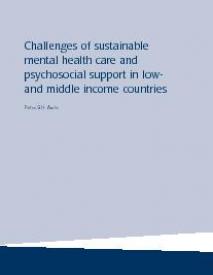Challenges of sustainable mental health care and psychosocial support in low-and middle income countries
Foreword Since its establishment in 1997, the Dutch War Trauma Foundation (WTF) is dedicated to the realisation of hope, peace of mind, and the full potential of communities impacted by individual and collective trauma, particularly in lower resourced settings. WTF works towards its vision together with local communities in development and exchange of knowledge, capacity building and innovation in psychosocial support. The vision is achieved through technical training and supervision, financial support, development and promotion of local and regional networks, and the compilation and dissemination of resources in several languages. In our experience of more than a decade in working together with local organisations, we understand that recovery of persons and communities from individual and collective trauma often requires time, commitment and patience. However, the complexity and fragility of settings where traumatic events have occurred, or continue to occur, challenge the efforts of those who attempt to lighten the psychological and social burdens of adversity of impacted communities. Particularly, how to achieve the required coverage and efficacy, the embedding in local infrastructures and durability of effects, we feel as challenging questions in our organisation. In the early days of 2007 the initiative taken by the director, Maurits Cohen (1997 - October 2009) to study the current opportunities and hindrances of sustainable care and support in low and middle income countries, became concrete thanks to the support and funding of the Dutch Ministry of Health, Wellbeing and Sports. The present report of this study underlines first of all the indissoluble relation between effective and adequate interventions and their sustainability. Sustainable recovery from the effects of war or organized violence recognises not only the innate capacity of persons to heal and rebuild their lives, but also the usefulness of culturally relevant and well thought out programmes to enhance natural coping and to open the way for new and creative ways to solve complex problems. Achieving sustainable care and support absolutely requires local commitment and institutionalisation, and respect for wisdom and knowledge of local persons who have lived the experience and dedicated their efforts to help. Beyond psychosocial support programmes themselves, advocacy, awareness raising, psycho-education, the promotion of human rights and sometimes reconciliation, may well enhance the growth of mutual responsibility and civic commitment in these fragile environs. In concert with the IASC Guidelines of 2007 this report emphasises the importance of inter-sectoral collaboration. Although teasing out the critical elements of sustainability of psychosocial recovery in very different settings does not always yield one concrete solution, the present report moves the learning a step further by pleading for additional collaboration of relevant agencies aimed at sustainable care and support. The War Trauma Foundation expresses their thanks to Petra Aarts for her efforts to describe the contexts and particularities of present mental health care and psychosocial support, and to identify and summarise some main obstacles for its sustainability. In the general awareness of such challenges, the opportunities rest to enhance the efficacy of all our mutual efforts. War Trauma Foundation also expresses gratitude to the Dutch Ministry of Health, Welfare and Sport for its support and funding of this study, and to each of the members of the committee that supported and advised the author in her endeavours. Finally, our kind and sincere thanks go to the organisations and local experts that so generously provided time, relevant information and reflections based on their direct experiences in this field. It is our hope that this report will function as a basis for further consideration and the development of sufficient consensus and direction of all relevant agencies in this quest.
Geachte bezoeker,
De informatie die u nu opvraagt, kan door psychotraumanet niet aan u worden getoond. Dit kan verschillende redenen hebben,
waarvan (bescherming van het) auteursrecht de meeste voorkomende is. Wanneer het mogelijk is om u door te verwijzen naar de bron
van deze informatie, dan ziet u hier onder een link naar die plek.
Als er geen link staat, kunt u contact opnemen met de bibliotheek,
die u verder op weg kan helpen.
Met vriendelijke groet,
Het psychotraumanet-team.
69 p. | Wartrauma [host]
http://www.wartrauma.nl/sites/default/files/Challenges%20sustainable%20mental%20health%20care_0.pdf


